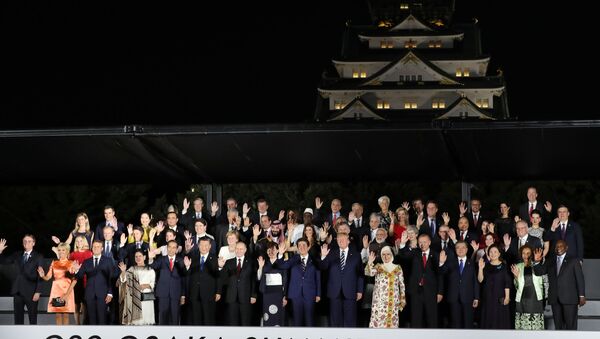Delivering a key speech at the Osaka Summit, Xi continued to promote opening-up and cooperation by announcing five major measures.
The president vowed to further open up Chinese market, including the release of the 2019 version of the negative list for foreign investment access, greater openness in the agriculture, mining, manufacturing and services sectors, and the establishment of six new pilot free trade zones.
China will also expand imports, reduce the overall tariff level, strive to remove non-tariff trade barriers, and take steps to cut institutional costs of imports. Xi also called on all parties to work together to build a high-quality world economy.
An important player for global governance
The president pledged to take more steps to improve China's business environment, implement a new foreign investment system from Jan 1 next year, establish a punitive compensation mechanism for intellectual property rights violations, and lift all foreign investment restrictions beyond the negative list, giving equal treatment to all types of businesses.
The country will vigorously advance economic and trade negotiations, including making efforts for the early conclusion of the Regional Comprehensive Economic Partnership and expediting the talks on the China-EU investment agreement and the China-Japan-Republic of Korea free trade agreement.
On the one hand, Xi's speech brought hope to the world economy at a time when global economic recovery is facing challenges and uncertainties thanks to the rise of trade protectionism and unilateralism in some economies since 2017. In fact, protectionism and unilateralism have become an impediment to global growth.
The World Trade Organization has said global trade growth increased by only 3 percent in 2018, and is set to decline to 2.6 percent in 2019. Besides, the G20 leaders in Osaka said growth remains low and risks remain tilted to the downside, and most importantly, trade and geopolitical tensions have intensified.
To overcome such challenges, Xi said China would pursue a free, fair and nondiscriminatory trade policy, and play a pivotal role in achieving strong, sustainable, balanced and inclusive global growth, and overcoming downside risks.
On the other hand, Xi's speech set the direction for cooperation on global economic governance. As a rules-based trade system, the WTO remains the cornerstone of global trade even though there is a need to reform the WTO so it can enhance its effectiveness through digitalization and application of emerging technologies.
Another major diplomatic achievement of Xi was his meeting with US President Donald Trump, which attracted wide global attention.
The two leaders set bilateral ties on the track by agreeing to resume the trade talks, thereby preventing trade tensions from rising further, which would have affected financial markets, businesses and consumers alike.
And Trump's remark that relations with China are "right back on track" indicated Beijing and Washington could be "strategic partners" if "the right deal is struck" and the US is "not hostile toward China".
BRICS nations should oppose protectionism
At a meeting with other BRICS leaders, Xi called on BRICS countries to oppose protectionism and advance multilateralism, by strengthening their policy coordination in multilateral institutions such as the United Nations, the G20 and the WTO, and deepen their strategic partnership to improve global governance.
In a series of bilateral meetings with leaders of countries such as Japan, France, Germany, Russia, India and South Africa, Xi emphasized the importance of defending the world order based on international law and the global governance system with the UN at its core, in order to pursue peace, stability and prosperity.
He appealed to major countries to shoulder their respective responsibilities in the face of global challenges, honor their commitments and take concrete actions to address serious environmental problems and climate change.
At a time when the world has reached a critical crossroad with global economic growth foundering, and raging trade frictions and development problems coming to the fore, Xi has embarked on a series of overseas trips since the beginning of June to promote multilateralism, free trade and economic globalization.
By so doing, he has sent a clear signal to the world once again that China, as a responsible power, stands by international rules and is committed to addressing international issues, driving global growth and promoting peace.
However, the road ahead for China is far from smooth, typically fraught with risks.
And although Trump has allowed US companies to sell components to Huawei, he did not remove the company from the US' blacklist.
Which suggests the two sides need to make greater efforts to narrow the fundamental gaps underlying the Sino-US trade dispute.
But since a comprehensive, enforceable deal could still prove elusive, China will continue to deepen reform and opening-up to cope with any risks and challenges that emerge in the future.
This article was originally published in China Daily.




